Introducing the Dominique chicken breed, a heritage breed with a rich history in American agriculture. Renowned for their hardiness and docile temperament, Dominiques are excellent choices for backyard enthusiasts and small-scale farmers alike. Their striking black and white plumage sets them apart, while their robust health and adaptability make them ideal for sustainable practices. From breeding to egg production, we delve into best practices for raising Dominique chickens, including coop designs, feeding regimes, and health considerations.
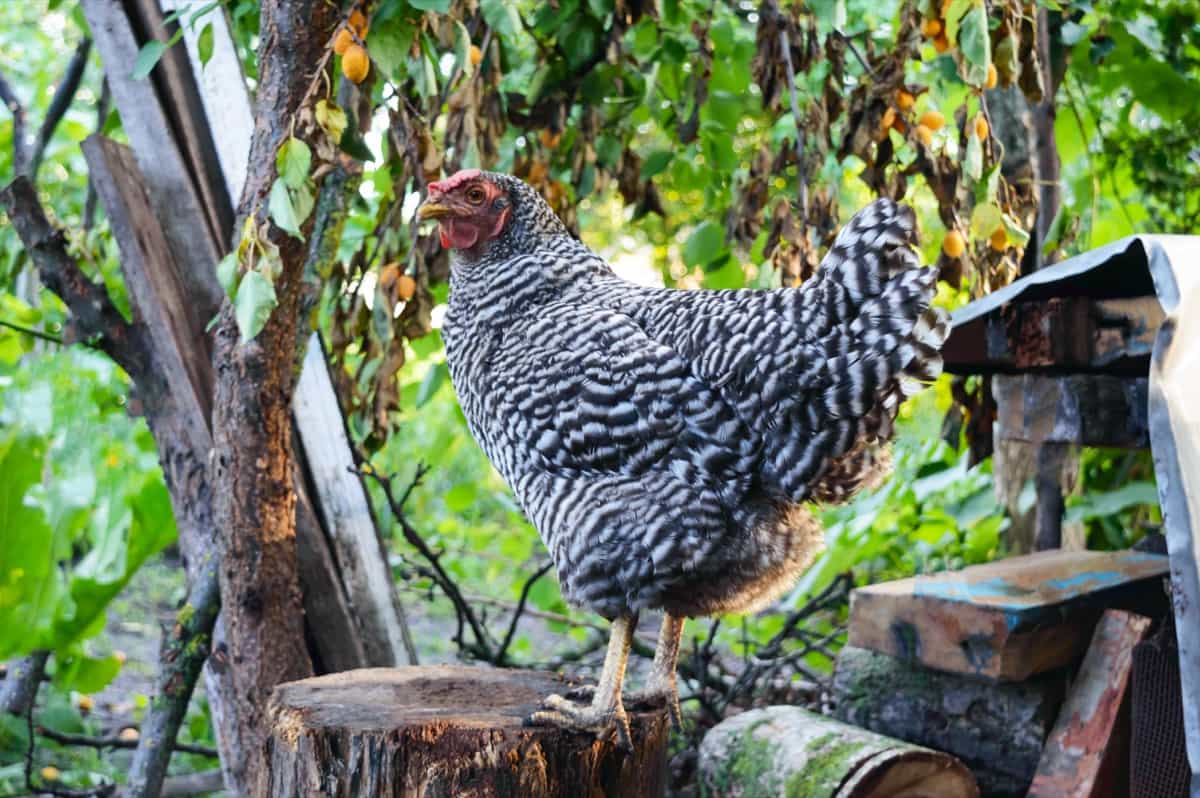
Raising Dominique Chickens
Introduction to Dominique Chickens
Dominique chickens, also known as Dominickers or Pilgrim Fowl, are a heritage breed of chicken with a long and rich history in the United States. They are one of the oldest American breeds of poultry. Dominique chickens are known for their distinctive barred plumage, rose comb, and hardy temperament. They are known for their hardiness, versatility, and ability to forage for their food.
History and Background
Dominique chickens have a fascinating history that dates back to the early days of American colonization. The early European settlers first developed them, and they were widely popular on American farms during the 19th century. In fact, Dominiques are considered to be one of the oldest American dual-purpose breeds.
Characteristics and Appearance
Dominique chickens are medium-sized birds with distinctive barred plumage. Their feathers are black with white barring, which provides excellent camouflage against predators. They have a rose comb, which is a small, compact comb that helps protect them from frostbite in cold weather. Dominiques are known for their hardiness, adaptability to various climates, and excellent foraging abilities.
- Dominique hens are good layers of medium-sized brown eggs. They can produce about 230 to 275 eggs per year, depending on the conditions and care they receive.
- Dominique chickens are dual-purpose birds, meaning they can be raised for both eggs and meat. They have a moderate growth rate and a good feed conversion ratio. When mature, they can weigh about 4 to 5 pounds.
- Dominique chickens are adaptable to various climates and environments. They can tolerate cold weather well, thanks to their thick feathers and small combs that prevent frostbite. They can also cope with heat and humidity as long as they have access to shade and water.
- Dominique chickens are friendly and docile birds that can get along well with other poultry and humans. They are not aggressive or flighty, and they rarely go broody. They are suitable for backyard or free-range systems, as they are good foragers and can fend off predators.
- Dominique chickens have a unique appearance that sets them apart from other breeds. They have black and white barred feathers that create a “cuckoo” pattern. Their combs are rose-shaped, which means they are flat and close to the head. Their earlobes, wattles, and skin are red, and their eyes are dark brown or black.
Getting Started with Dominique Chickens
Choosing the Right Birds: When selecting Dominique chickens, look for healthy birds from reputable breeders or hatcheries. Consider factors such as breed standards, temperament, and egg-laying capabilities.
In case you missed it: Mastering the Art of Raising Jersey Giant Chickens: Care, Feeding, and More
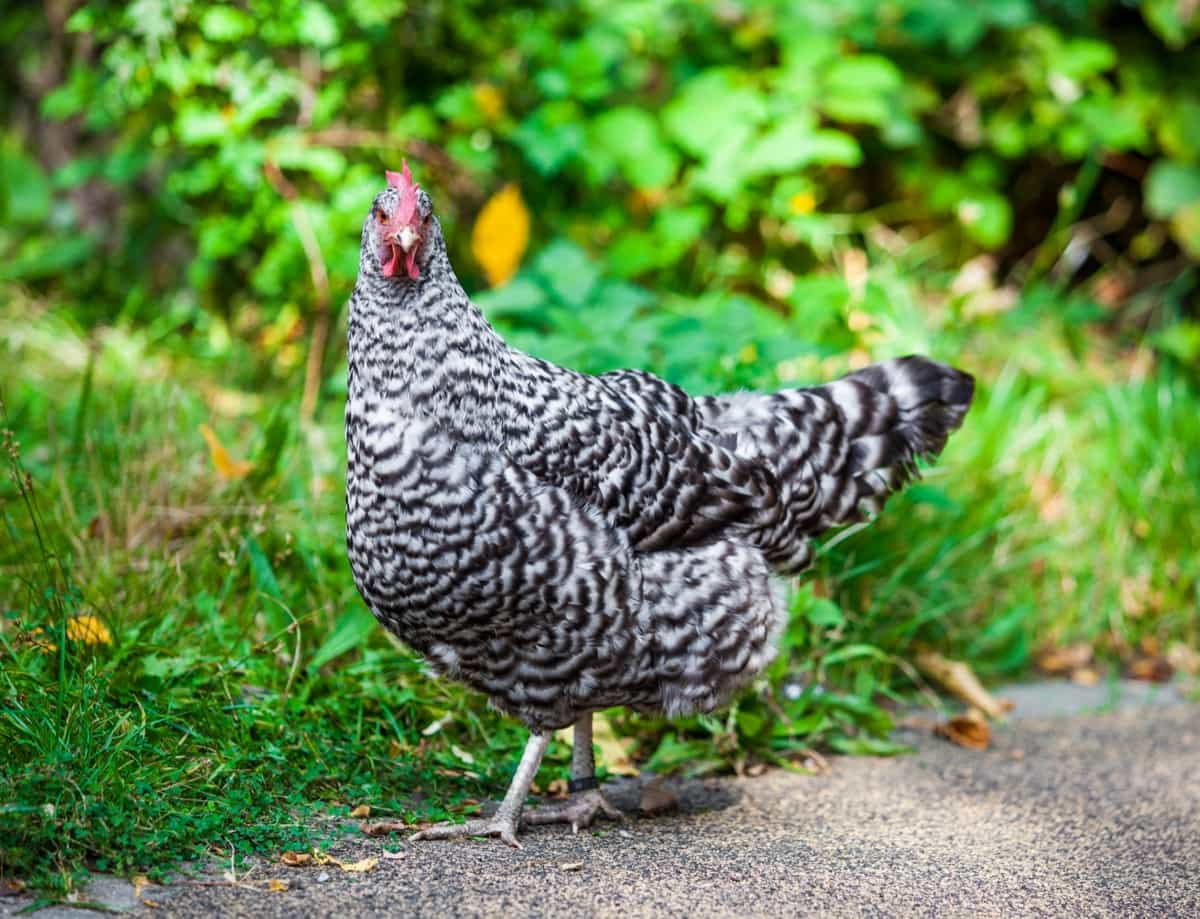
Setting Up Your Coop and Run
- Provide your Dominique chickens with a safe and comfortable living environment.
- Design a chicken coop that offers adequate space, ventilation, and protection from predators.
- Ensure that the coop is well-maintained and clean.
Feeding Your Dominique Chickens
Basic Diet and Nutritional Needs: Dominiques are excellent foragers and can find a significant portion of their diet by free-ranging. However, it’s important to supplement their foraging with a balanced commercial feed that provides essential nutrients. Consult with a poultry nutritionist or veterinarian to determine the best feed for your flock.
Feeding Schedule and Tips
- Establish a regular feeding schedule for your Dominique chickens.
- Provide fresh water, and feed them a balanced diet of grains, protein, vitamins, and minerals.
- Avoid overfeeding or underfeeding, as both can have negative effects on their health.
Housing Your Flock
Designing a Chicken Coop
- Design a chicken coop that provides enough space for your flock to move around comfortably.
- Ensure proper ventilation, insulation, and protection from the elements.
- Incorporate nesting boxes for egg-laying and perches for roosting.
Maintaining Proper Ventilation and Temperature: Proper ventilation prevents the buildup of moisture and ammonia in the coop. Monitor the temperature inside the coop to ensure it remains within a comfortable range for your chickens.
Health and Wellness
Common Health Issues: Dominiques are generally hardy birds but susceptible to certain health issues. These include respiratory infections, parasites, and injuries. Regularly inspect chickens for signs of illness and consult with a veterinarian if needed.
Preventative Care and Vaccinations: Implement preventative measures to keep your flock healthy. This may include vaccinations against common poultry diseases, regular deworming, and maintaining good hygiene practices.
Daily Care and Management
Routine Checks: Regularly inspect your chickens for signs of illness, injury, or abnormalities. Check their feathers, eyes, beaks, legs, and overall behavior. Early detection of issues can help prevent complications.
Cleaning and Maintenance: Keep the chicken coop clean and well-maintained. Regularly remove droppings, replace bedding, and sanitize the coop to prevent the buildup of bacteria and parasites.
Handling and Behavior
Social Behavior: Dominiques are generally calm and docile birds. If handled gently and regularly, they can be friendly and enjoy human interaction. However, each chicken has its own personality, so it’s important to observe and respect their behavior.
In case you missed it: Ultimate Guide to Raising Legbar Chickens: Breeding, Farming Practices, Diet, Egg-Production
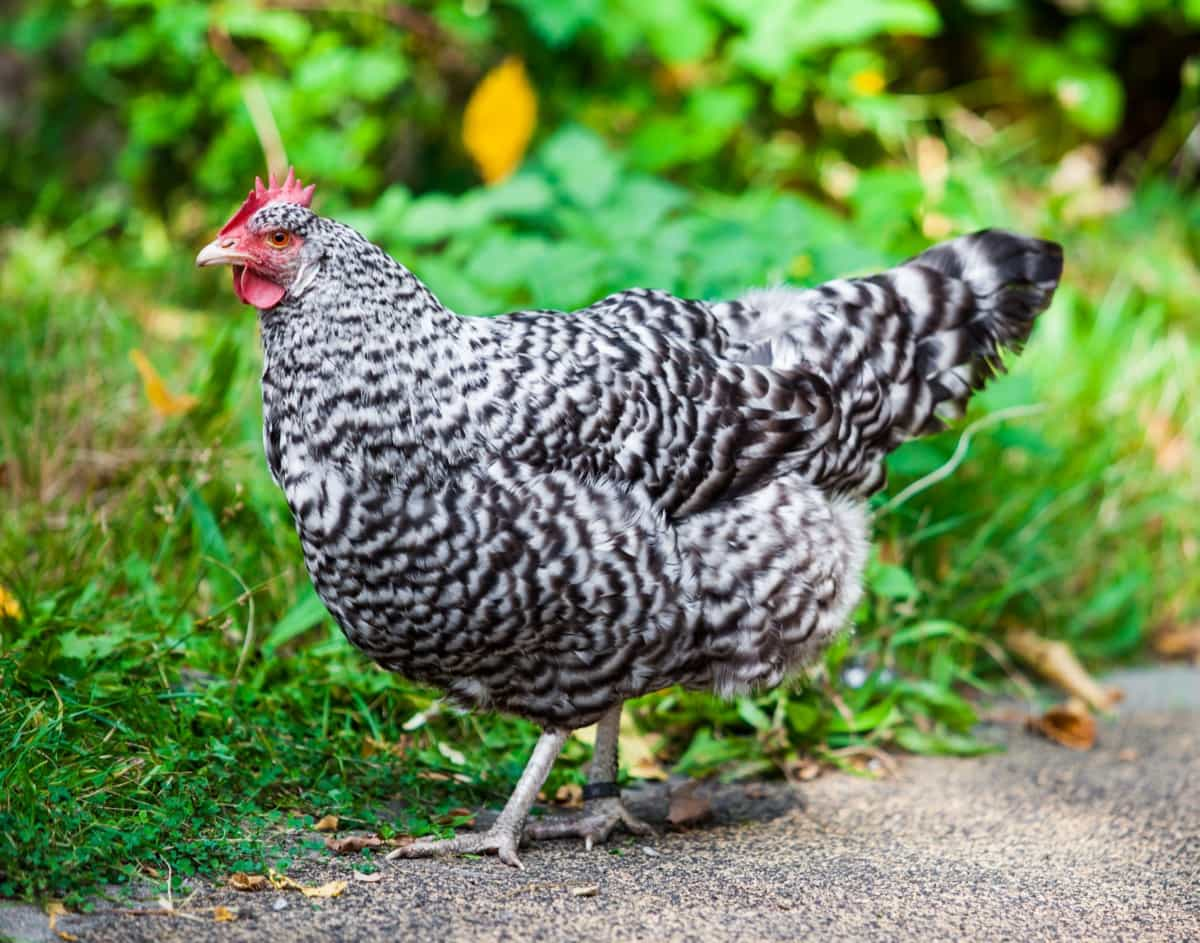
Handling Techniques and Tips
- When handling your Dominique chickens, approach them calmly and avoid sudden movements.
- Use both hands to support their body and avoid gripping them tightly.
- Regularly interact with your chickens to build trust and establish a bond.
Egg Production
Understanding Egg Laying: Dominique hens are reliable layers of medium—to large-sized brown eggs. They tend to go broody, meaning they may want to sit on their eggs and hatch them. This natural behavior can be advantageous if you’re interested in breeding or hatching chicks.
Maximizing Egg Production: To maximize egg production, ensure that your Dominique chickens have a balanced diet, access to fresh water, and a comfortable nesting area. Collect eggs regularly to prevent them from being damaged or becoming dirty.
Breeding Dominique Chickens
Basics of Chicken Genetics: Understanding the basics of chicken genetics can help you make informed breeding decisions. Learn about traits, inheritance patterns, and how to select breeding pairs to achieve desired characteristics.
Breeding Strategies: Consider your breeding goals and select breeding pairs that complement in terms of traits, health, and temperament. Monitor the breeding process closely and provide appropriate care for the breeding birds and resulting chicks.
Raising Chicks
Incubation and Hatching: Dominique hens tend to go broody and may want to incubate their eggs. However, if you prefer to use an incubator, ensure temperature and humidity levels are appropriate for successful hatching.
Caring for Young Chicks: Newly hatched chicks require special care and attention. Please provide them with a warm and safe brooder environment, appropriate feed, and clean water. Monitor their health and growth closely during the early stages of their development.
Predator Prevention and Safety
Identifying Potential Threats
- Identify common predators in your area, such as raccoons, foxes, or hawks.
- Take measures to secure your coop and run to prevent predators’ access.
- Regularly inspect the perimeter for signs of potential threats.
Protective Measures and Strategies: Implement predator-proofing measures, such as sturdy fencing, secure latches, and predator deterrents like motion-activated lights or sound devices. Consider using electric fencing for added protection.
In case you missed it: How to Raise Welsummer Chickens: A Comprehensive Guide for Beginners
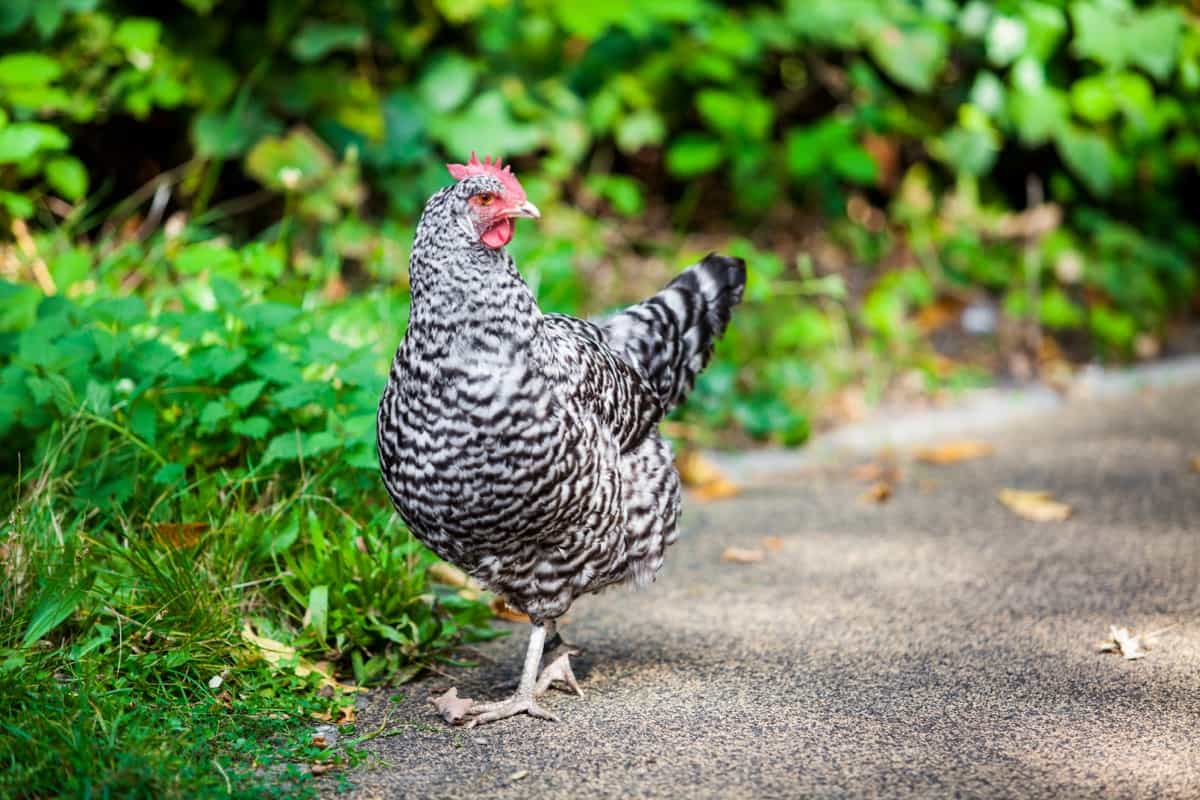
Seasonal Care Considerations
Winterizing Your Coop
- Insulate the coop and provide adequate bedding to keep your chickens warm during cold winter months.
- Ensure proper ventilation, moisture buildup and frostbite.
- Offer additional feed to provide extra energy for maintaining body heat.
Summer Care Tips
- Provide shade and access to fresh water to help your chickens stay cool during hot summer days.
- Consider using fans or misters to lower the temperature inside the coop.
- Monitor chickens for signs of heat stress and take appropriate measures to keep them comfortable.
Integrating New Birds
Quarantine Procedures: Quarantine new birds for some time before introducing them to the existing flock. This helps prevent the spread of diseases and allows and observes the new birds for any signs of illness.
Introducing New Chickens to the Flock
- Gradually introduce new birds to the existing flock to minimize stress and aggression.
- Provide separate but adjacent spaces for them to see and interact with each other before allowing direct contact.
- Monitor their behavior closely during the integration process.
Sustainable Practices
Feeding From Your Garden: Supplement your chickens’ diet with fresh produce from your garden. This can include kitchen scraps, fruits, vegetables, and herbs. Ensure that the foods are safe and appropriate for chickens.
Managing Waste: Implement proper waste management practices to minimize environmental impact. Consider composting chicken manure and bedding materials to create nutrient-rich compost for your garden.
Common Problems and Solutions
Behavioral Issues: Dominiques, like any other breed, may exhibit behavioral issues such as aggression, feather pecking, or egg-eating. Address these issues by providing a stimulating environment and adequate space and addressing any underlying causes of stress or boredom.
Health Emergencies: In case of health emergencies, it’s important to have a plan in place. Establish a relationship with a poultry veterinarian and familiarize yourself with common poultry diseases and their symptoms. Promptly seek professional help if you suspect an illness or injury in your Dominique chickens.
Raising Dominique Chickens: Tips in Breeding, Feeding, Egg-Production, and Care
Dominique chicken care: Dominiques are easy to care for and require regular feeding, access to fresh water, a clean and comfortable coop, and protection from predators and parasites.
Raising Dominique chickens: Dominiques are hardy and adaptable birds that are suitable for backyard flocks. They are known for their calm and friendly temperament, making them great for families with children.
Dominique chicken breed: Dominiques are recognized as America’s first chicken breed and have a long history. They have distinctive black and white plumage and a rose comb and are smaller in size compared to some other breeds.
Dominique chicken eggs: Dominique hens lay light to medium brown eggs, and they are considered good layers, producing an average of over 200 eggs per year. They typically start laying around 21 to 24 weeks of age.
In case you missed it: Ultimate Guide to Raising Araucana Chickens: Breed Profile, Farming Economics, Diet, and Care
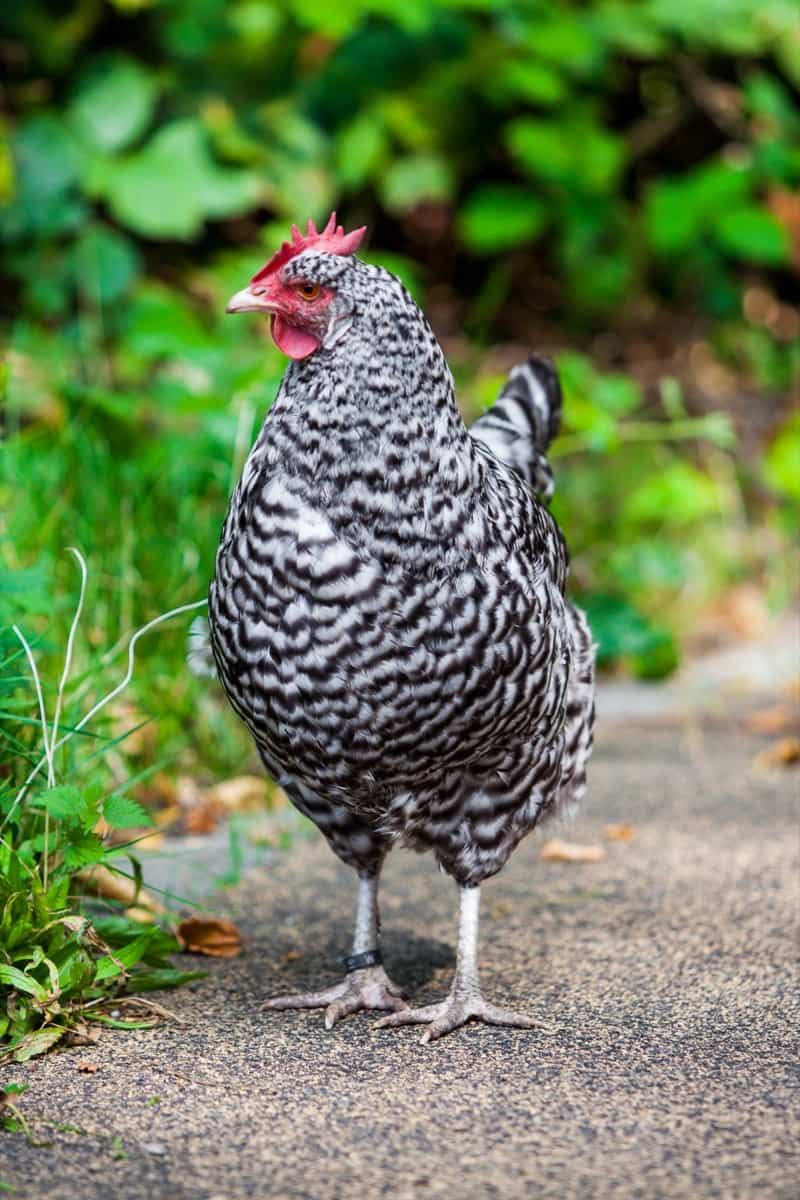
Coop designs: When designing a coop for Dominiques, consider providing adequate space, ventilation, insulation, and protection from the elements and predators. Dominiques require at least four square feet of coop space per bird.
How to breed Dominique chickens: Breeding Dominiques involves selecting breeding pairs based on desired traits, monitoring the breeding process closely, and providing appropriate care for the breeding birds and resulting chicks.
Health issues: Dominiques are generally healthy birds with no known specific health issues. However, like all chickens, they should be monitored for parasites and pests, and proper care should be taken to prevent or treat any health issues that may arise.
Feeding Dominique chickens: Dominiques are good foragers and can find portion of their diet by free-ranging. However, they should also be supplemented with a balanced commercial feed that provides essential nutrients. Fresh water should be provided at all times.
Temperament: Dominiques have a calm, docile, and friendly temperament. They are known to be easygoing and can be easily tamed. They are also good mothers and may go broody.
Best practices for Dominique chickens: Some best practices for raising Dominiques include providing a suitable living environment, regular health checks, proper nutrition, predator prevention measures, and implementing sustainable practices such as composting chicken waste.
Dominique chicken history: Dominiques have a long history and are recognized as one of the oldest chicken breeds in America. They have been valued for their egg-laying capabilities, meat, and feathers.
Dominique Chicken vs. Plymouth Rock: Dominique and Plymouth Rocks are both popular heritage chicken breeds. While they have some similarities in appearance and characteristics, they are distinct breeds with their unique traits.
Caring for Dominique chicks: Newly hatched Dominique chicks require a warm and safe brooder environment, appropriate feed, and clean water. They should be monitored closely during their early stages of development.
Predators and safety: Common predators of Dominique chickens include raccoons, foxes, and hawks. Implementing predator-proofing measures such as secure fencing and proper coop design can help protect the flock.
Sustainable practices with Dominique chickens: Some sustainable practices with Dominique include feeding them from your garden with kitchen scraps and managing waste through composting. These practices can help reduce waste and provide natural sources of nutrition for the chickens.
Dominique chicken for meat and eggs: Dominiques are considered a dual-purpose breed, meaning they are suitable for both meat and egg production. They are known for their good meat quality and reliable egg-laying capabilities.
Winter care: During winter, Dominiques should have a well-insulated coop, adequate bedding, and access to fresh water. Providing additional feed can help them maintain body heat.
Molting: Like other chickens, Dominiques go through molting, which is the process of shedding and regrowing feathers. Molting typically occurs once a year and can affect egg production.
Egg laying frequency of Dominique chickens: Dominique hens are considered good layers, producing an average of over 200 eggs per year. However, the overall health of the bird can affect when they start laying and their egg-laying frequency.
In case you missed it: Ultimate Guide to Raising Polish Chickens: Breed Profile, Farming Economics, Diet, and Care
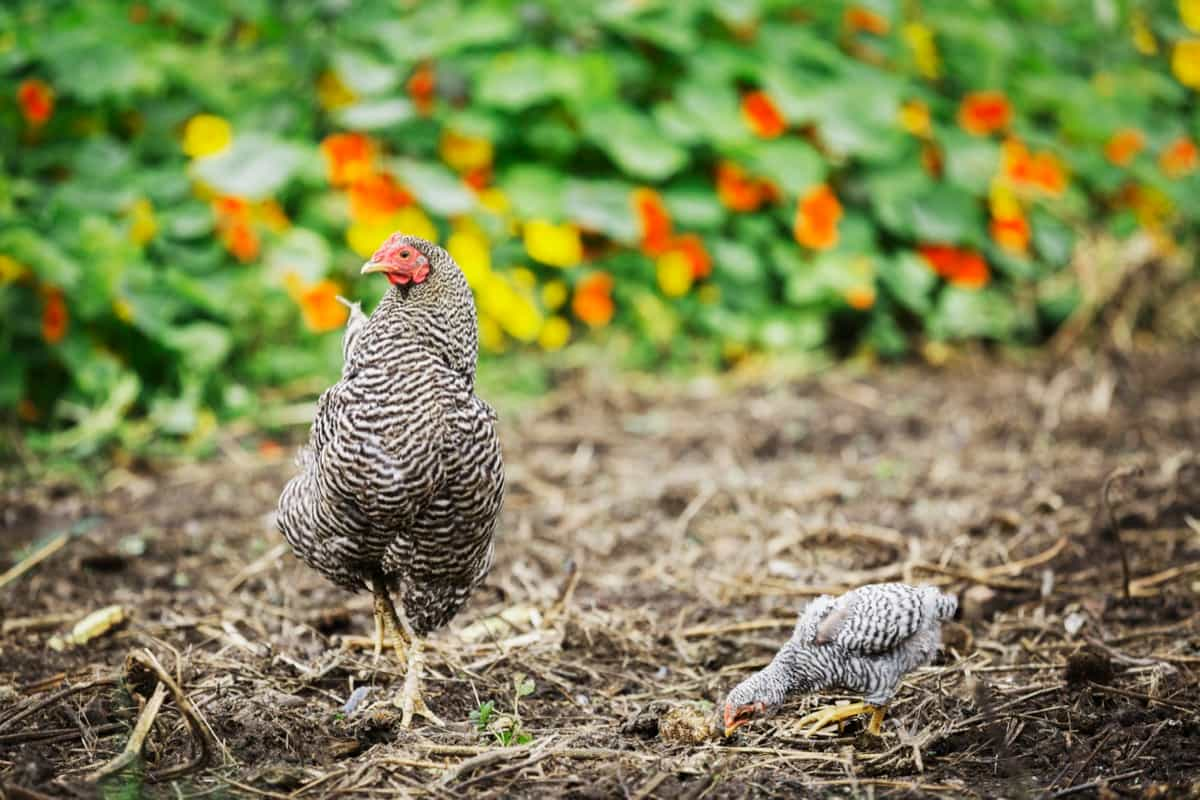
Conclusion
Raising Dominique chickens offers a rewarding experience for both beginners and seasoned poultry keepers. Their resilient nature, prolific egg-laying abilities, and gentle demeanor make them valuable additions to any flock. By following proper care guidelines and implementing sustainable practices, enjoy the benefits of these historic birds for years to come.
Note: The images presented in this post are intended solely for representation purposes. The images are meant to serve as visual aids and should not be relied upon as accurate representations of their real-life counterparts.
- Types of Pesticides Used in Agriculture: A Beginner’s Guide
- Economical Aquaculture: A Guide to Low-Budget Fish Farming
- 15 Common Planting Errors That Can Doom Your Fruit Trees
- How to Make Houseplants Bushy: Effective Tips and Ideas
- Innovative Strategies for Boosting Coconut Pollination and Yield
- Pollination Strategies for Maximum Pumpkin Yield
- The Complete Guide to Chicken Fattening: Strategies for Maximum Growth
- Natural Solutions for Tulip Problems: 100% Effective Remedies for Leaf and Bulb-Related Issues
- Revolutionizing Citrus Preservation: Towards a Healthier, Greener Future
- Natural Solutions for Peony Leaf and Flower Problems: 100% Effective Remedies
- Maximizing Profits with Avocado Contract Farming in India: A Comprehensive Guide
- Natural Solutions for Hydrangea Problems: 100% Effective Remedies for Leaf and Flowers
- The Ultimate Guide to Choosing the Perfect Foliage Friend: Bringing Life Indoors
- From Sunlight to Sustainability: 15 Ways to Use Solar Technology in Agriculture
- The Ultimate Guide to Dong Tao Chicken: Exploring from History to Raising
- The Eco-Friendly Makeover: How to Convert Your Unused Swimming Pool into a Fish Pond
- Mastering the Art of Delaware Chicken Farming: Essentials for Healthy Backyard Flocks
- 20 Best Homemade Fertilizers for Money Plant: DIY Recipes and Application Methods
- How to Craft a Comprehensive Free-Range Chicken Farming Business Plan
- Brighten Your Flock: Raising Easter Egger Chickens for Beauty and Bounty
- How to Optimize Your Poultry Egg Farm Business Plan with These Strategies
- Subsidy for Spirulina Cultivation: How Indian Government Schemes Encouraging Spirulina Farmers
- Ultimate Guide to Raising Dominique Chickens: Breeding, Feeding, Egg-Production, and Care
- Mastering the Art of Raising Jersey Giant Chickens: Care, Feeding, and More
- Ultimate Guide to Raising Legbar Chickens: Breeding, Farming Practices, Diet, Egg-Production
- How to Raise Welsummer Chickens: A Comprehensive Guide for Beginners
- How to Protect Indoor Plants in Winter: A Comprehensive Guide
- Ultimate Guide to Grow Bag Gardening: Tips, Tricks, and Planting Ideas for Urban Gardeners
- Guide to Lotus Cultivation: How to Propagate, Plant, Grow, Care, Cost, and Profit
- Agriculture Drone Subsidy Scheme: Government Kisan Subsidy, License, and How to Apply Online
- Ultimate Guide to Raising Araucana Chickens: Breed Profile, Farming Economics, Diet, and Care
- Bringing Hydroponics to Classroom: Importance, Benefits of Learning for School Students
- Ultimate Guide to Raising Polish Chickens: Breed Profile, Farming Economics, Diet, and Care
- Ultimate Guide to Raising Australorp Chickens: Profile, Farming Economics, Egg Production, Diet, and Care
- Silkie Chicken Farming: Raising Practices, Varieties, Egg Production, Diet, and Care
- Sussex Chicken Farming: Raising Practices, Varieties, Egg Production, Diet and Care